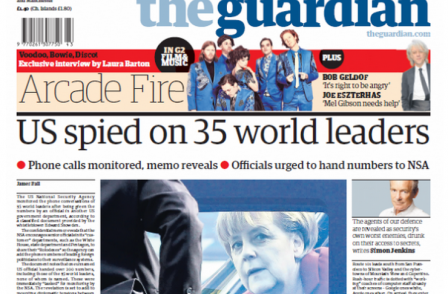
Guardian News and Media has revealed it is to leave press self regulation and will now be regulated by itself.
For the present, its own readers' editor – former Guardian managing editor, news editor and reporter Chris Elliott – will hear all complaints against the paper.
This follows the closure of the Press Complaints Commission and the launch of the Independent Press Standards Organisation on Monday. Talks are ongoing between GNM and IPSO with a view to the publisher possibly signing up.
The Scott Trust, which owns The Guardian, appoints the readers' editor. It is also to appoint to two further “independent” figures to work alongside external ombudsman John Willis.
And it is set to announce plans to allow complainants to go to external arbitration, where The Guardian’s legal team consider it appropriate.
Revealing the move in a leader column, The Guardian said it acknowledged there have been some improvements made under the new Independent Press Standards Organisation. But it said: “…the way IPSO came into being has not been satisfactory.
"The attempt to graft a medieval-style royal charter on to press regulation was a constitutional train crash.
“And the press – which kept control of the old PCC via a funding body and other mechanisms – has crafted something similar for IPSO, with industry tentacles reaching into the funding, control and constitutional arrangement of the new regulator.
“The Guardian, in common with the majority of what used to be called daily national broadsheet papers in the UK, is not signing up to IPSO at this stage; nor are several magazines or major new media players. This paper will wait to see whether Sir Alan succeeds in reforming some of the governance issues that still cause anxiety. In the meantime, we will reinforce our own system of complaints and mediation.”
Under the old PCC, Express Newspapers was characterised as a “rogue publisher” because it refused to take part in self regulation.
The Guardian, Observer and Guardian.com join Evgeny Lebedev’s Indendent and Standard titles and the FT in refusing to sign up to IPSO.
Guardian News and Media, the Independent titles and the Standard are three out of the ten most-read UK national newspapers in print and online.
In the Leveson Report, Sir Brian Leveson called for the formation of a new regulator which was independent of the press and the government and whose independence was guaranteed by statute.
As currently constituted, IPSO is led by a 12-person board which comprises the chair – Sir Alan Moses – six independent members, and five publishing industry representatives.
Publishers, via the Regulatory Funding Committee, have a say over the choice industry representatives on the two bodies.
IPSO has the power to levy fines of up to £1m in extreme circumstances and launch investigations into serious wrongdoing by publishers.
The Guardian said: “In the days after the Leveson report, the editors of virtually all national papers met and agreed on the great majority of its recommendations. We enthusiastically support the principle of independent self-regulation as well as the industry’s code of practice. We hope that Sir Alan and his board can improve Ipso so that it commands broader general confidence.”
Guardian editorial: why we're not (yet) signing up for IPSO – & how we'll manage regulation for now https://t.co/E1wKARo7vA
— alan rusbridger (@arusbridger) September 4, 2014
Email pged@pressgazette.co.uk to point out mistakes, provide story tips or send in a letter for publication on our "Letters Page" blog
